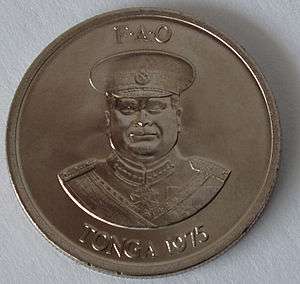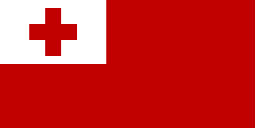Economy of Tonga
Tonga's economy is characterized by a large nonmonetary sector and a heavy dependence on remittances from the half of the country's population that lives abroad, chiefly in Australia, New Zealand, and the United States. Much of the monetary sector of the economy is dominated, if not owned, by the royal family and nobles. This is particularly true of the telecommunications and satellite services. Much of small business, particularly retailing on Tongatapu, is now dominated by recent Chinese immigrants who arrived under a cash-for-passports scheme that ended in 1998.
 A Tongan coin | |
| Currency | pa'anga (T$) |
|---|---|
| 1 July - 30 June | |
Trade organisations | none |
| Statistics | |
| GDP | |
| GDP rank | 187th (nominal) / 183rd (PPP) |
GDP growth |
|
GDP per capita | |
GDP by sector | agriculture: 20.4%, industry: 18.6%, services: 61% (2011 est.) |
| 2.914% (2018)[1] | |
Population below poverty line | 16% (FY09/10) |
Labour force | 47,320 (2011) |
Labour force by occupation | agriculture 31.8%, industry 30.6%, services 37.6% (2003 est.) |
| Unemployment | 8% (FY09/10) |
Main industries | tourism, construction, fishing |
| 85th (2017)[2] | |
| External | |
| Exports | $62 million (f.o.b., 2010) |
Export goods | squash, fish, vanilla beans, root crops, domain names |
Main export partners | |
| Imports | $92 million (f.o.b., 2010) |
Import goods | foodstuffs, machinery and transport equipment, fuels, chemicals |
Main import partners | |
| Public finances | |
| $50 million (2010) | |
| Revenues | $109.5 million (2011 est.) |
| Expenses | $109.5 million (2011 est.) |
| Economic aid | Australia $5.5 million, New Zealand $2.3 million (FY01/02) |
The manufacturing sector consists of handicrafts and a few other very smallscale industries, all of which contribute only about 3% of GDP. Commercial business activities also are inconspicuous and, to a large extent, are dominated by the same large trading companies found throughout the South Pacific. In September 1974, the country's first commercial trading bank, the Bank of Tonga, opened.
Rural Tongans rely on plantation and subsistence agriculture. Coconuts, vanilla beans, and bananas are the major cash crops. The processing of coconuts into copra and desiccated coconut is the only significant industry. Pigs and poultry are the major types of livestock. Horses are kept for draft purposes, primarily by farmers working their api. More cattle are being raised, and beef imports are declining.
Tonga's development plans emphasize a growing private sector, upgrading agricultural productivity, revitalizing the squash and vanilla bean industries, developing tourism, and improving the island's communications and transportation systems. A small but growing construction sector is developing in response to the inflow of aid monies and remittances from Tongans abroad. The copra industry is plagued by world prices that have been depressed for years.
Efforts are being made to discover ways to diversify. One hope is seen in fisheries; tests have shown that sufficient skipjack tuna pass through Tongan waters to support a fishing industry. Another potential development activity is exploitation of forests, which cover 35% of the kingdom's land area but are decreasing as land is cleared. Coconut trees past their prime bearing years also provide a potential source of lumber.
The tourist industry is relatively undeveloped; however, the government recognizes that tourism can play a major role in economic development, and efforts are being made to increase this source of revenue. Cruise ships often stop in Nukuʻalofa and Vava'u.
According to the CIA World Factbook,
The Tongan economy's base is agriculture, which contributes 30% to GDP. Squash, coconuts, bananas, and vanilla beans are the main crops, and agricultural exports make up two-thirds of total exports. The country must import a high proportion of its food, mainly from New Zealand. The industrial sector accounts for only 10% of GDP. Tourism is the primary source of hard currency earnings. The country remains dependent on sizable external aid and remittances to offset its trade deficit. The government is emphasizing the development of the private sector, especially the encouragement of investment.
Energy
Electricity - production: 53 GW·h (2008)
Electricity - production by source:
- foclear:
- fossil fuel: 92%
- nuclear: 0%
- hydro: 0%
- renewables: 8% (2009)
Electricity - consumption: 38,13 GW·h (2003)
Electricity - exports: 0 kW·h (2003)
Electricity - imports: 0 kW·h (2003)
Tonga is installing tailor-made policies to power its remote islands in a sustainable way – without turning to expensive grid-extensions. A number of islands within the Kingdom of Tonga are lacking basic electricity supply. In view of the decreasing reliability of fossil-fuel electricity generation, its increasing costs and negative environmental side-effects, renewable energy solutions have attracted the government’s attention. Together with IRENA, Tonga has charted out a renewable energy based strategy to power the main and outer islands alike. The strategy focuses on Solar Home Systems that turn individual households into small power plants. In addition, it calls for the involvement of local operators, finance institutions and technicians to provide sustainable business models as well as strategies to ensure the effective operation, management and maintenance once the systems are installed.[5]
Other data
Agriculture - products: squash, coconuts, copra, bananas, vanilla beans, cocoa, coffee, ginger, black pepper; fish
Currency: 1 pa'anga (T$) = 100 seniti
Exchange rates: pa'anga (T$) per US$1 – 1.9716 (2004), 2.142 (2003), 2.1952 (2002), 2.1236 (2001), 1.6250 (November 1999), 1.4921 (1998), 1.2635 (1997), 1.2323 (1996), 1.2709 (1995)
References
- "World Economic Outlook Database, October 2019". IMF.org. International Monetary Fund. Retrieved 21 October 2019.
- "Ease of Doing Business in Tonga". Doingbusiness.org. Retrieved 25 January 2017.
- "Exports Partners of Tonga". CIA World Factbook. 2012. Retrieved 1 August 2013.
- "Imports Partners of Tonga". CIA World Factbook. 2012. Retrieved 1 August 2013.
- http://www.irena.org
